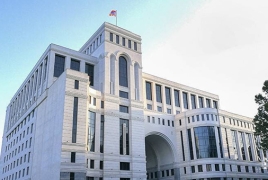
Armenia’s Foreign Ministry has expressed deep disappointment with the “Istanbul Declaration” and accompanying resolutions adopted during the latest ministerial conference of the Organization of Islamic Cooperation (OIC), criticizing the wording as distorted and extremely one-sided.
The ministry emphasized that these formulations contradict the goal and rationale of establishing lasting peace in the region. It warned OIC member states that the narrative of “Western Azerbaijan,” disguised as a human rights issue, constitutes a clear territorial claim by Azerbaijan on Armenia’s sovereign territory. This is evidenced by the founding documents of an artificially created “organization” with this purpose.
The ministry clarified that "Western Azerbaijan" historically refers to Azerbaijan’s western regions — Qazakh, Tovuz, Aghstafa, Gadabay, Dashkasan, Kalbajar, Lachin, Gubadli, Zangilan, and Nakhichevan — and that there is no such entity within Armenia.
As for Azerbaijanis who lived in Soviet Armenia, they left voluntarily in the final years of the USSR, having sold, exchanged, or received compensation for their property from the Armenian government. In contrast, Armenians in Baku, Sumgait, and other parts of Azerbaijan were subjected to massacres and forced expulsions. The most recent ethnic cleansing occurred in autumn 2023 when over 115,000 Armenians fled Nagorno-Karabakh.
The ministry accused the OIC of indirectly encouraging such actions, undermining its own positions on Middle Eastern crises over the past two years. It also expressed astonishment at the misinterpretation of the Khojaly events, asserting that the known facts about crimes against humanity refute any accusations against Armenia.
The adopted declaration also regrettably diverges from previous OIC member statements supporting Armenia-Azerbaijan peace talks, instead including one-sided conditions. Armenia reiterated its readiness to sign the peace agreement without delay, having proposed consultations on location and timing, as well as constructive solutions to Azerbaijan’s concerns. The ministry called on interested parties to urge Azerbaijan to sign the agreement promptly without raising artificial barriers.
Deep regret was also expressed over a resolution on cultural heritage that ignores the destruction of Armenian heritage under Azerbaijani control. The ministry criticized the document for framing the issue in religious terms, fueling misleading and dangerous narratives. It reaffirmed Armenia’s respect for Islamic cultural heritage, which is well-documented and verifiable.
The ministry urged OIC member states to reconsider and reject resolutions that target Armenia’s sovereignty and jeopardize the peace process with Azerbaijan. It stated that genuine prospects for peace in the South Caucasus exist and that the approach taken by international organizations should support, not hinder, these efforts. Armenia remains committed to its peace agenda and expects support from international partners, including the OIC.
MP Tigran Abrahamyan of the “I Have Honor” faction commented on Facebook that the “first consequences” of Prime Minister Nikol Pashinyan’s visit to Turkey were evident in the Istanbul session of the OIC Council of Foreign Ministers. Azerbaijan spearheaded the “Istanbul Declaration” and five resolutions, asserting a right for “forcibly displaced Azerbaijanis” to return to Armenia — referred to in the document as “Western Azerbaijan.”
Pashinyan visited Turkey on June 20 for a one-day working trip. The agenda was undisclosed per mutual agreement and confirmed by the Prime Minister. In Istanbul, he met with members of the local Armenian community. Responding to a question about Turkey’s aim of realizing the “Great Turan” idea, he stated there would be no “Zangezur corridor,” only a “Crossroads of Peace.”

